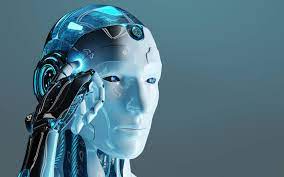Artificial intelligence (AI) is intelligence—perceiving, synthesizing, and inferring information—demonstrated by machines, as opposed to intelligence displayed by non-human animals and humans. Example tasks in which this is done include speech recognition, computer vision, translation between (natural) languages, as well as other mappings of inputs.
AI applications include advanced web search engines (e.g., Google Search), recommendation systems (used by YouTube, Amazon and Netflix), understanding human speech (such as Siri and Alexa), self-driving cars (e.g., Waymo), automated decision-making and competing at the highest level in strategic game systems (such as chess and Go).[1] As machines become increasingly capable, tasks considered to require "intelligence" are often removed from the definition of AI, a phenomenon known as the AI effect.[2] For instance, optical character recognition is frequently excluded from things considered to be AI,[3] having become a routine technology.[4]
Artificial intelligence was founded as an academic discipline in 1956, and in the years since has experienced several waves of optimism,[5][6] followed by disappointment and the loss of funding (known as an "AI winter"),[7][8] followed by new approaches, success and renewed funding.[6][9] AI research has tried and discarded many different approaches since its founding, including simulating the brain, modeling human problem solving, formal logic, large databases of knowledge and imitating animal behavior. In the first decades of the 21st century, highly mathematical-statistical machine learning has dominated the field, and this technique has proved highly successful, helping to solve many challenging problems throughout industry and academia.[9][10]
The various sub-fields of AI research are centered around particular goals and the use of particular tools. The traditional goals of AI research include reasoning, knowledge representation, planning, learning, natural language processing, perception, and the ability to move and manipulate objects.[a] General intelligence (the ability to solve an arbitrary problem) is among the field's long-term goals.[11] To solve these problems, AI researchers have adapted and integrated a wide range of problem-solving techniques – including search and mathematical optimization, formal logic, artificial neural networks, and methods based on statistics, probability and economics. AI also draws upon computer science, psychology, linguistics, philosophy, and many other fields.
The field was founded on the assumption that human intelligence "can be so precisely described that a machine can be made to simulate it".[b] This raised philosophical arguments about the mind and the ethical consequences of creating artificial beings endowed with human-like intelligence; these issues have previously been explored by myth, fiction and philosophy since antiquity.[13] Computer scientists and philosophers have since suggested that AI may become an existential risk to humanity if its rational capacities are not steered towards beneficial goals.[c]
What will i learn?
- apply the basic principles, models, and algorithms of AI to recognize, model, and solve problems in the analysis and design of information systems. analyze the structures and algorithms of a selection of techniques related to searching, reasoning, machine learning, and language processing.
- A bachelor's degree in a relevant subject, such as information technology, computer engineering, statistics, or data science, is the very minimum needed for entry into the area of artificial intelligence engineering.
-
test
00:09:19
-
What is artificial intelligence?
.
-
Types of artificial intelligence—weak AI vs. strong AI
.
-
what is AI
00:05:27
-
test
00:10:00
-
AI Quiz
0:10:00
-
test
.
Frequently asked question
How does AI work?
Learning processes.
Reasoning processes.
Self-correction processes.
Why is artificial intelligence important?
What are the advantages and disadvantages of artificial intelligence?
SAGE Moocs
A Massive Open Online Course (MOOC) is an online course that is designed to be accessible to a large number of learners from around the world. MOOCs are typically free or low-cost and are offered by universities, colleges, and other educational institutions, as well as by private companies and organizations.
Technical Business Language Soft skills Personal developmentReviews
-
 great
great


Write a public review